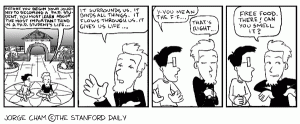A couple of weeks ago, we promised a more detailed review of our experience at the General Assembly 2016. Here is something we deemed worthy to spread word about.
EGU is dedicated to geoscience, so the first thing we are all looking for in the general assembly and EGU’s journals is…interesting science! Duh.
But science doesn’t live in an isolated space of labs and computing centers. There is ample public discussion (here, for example) about how important it is to make science work for the general public; in the same vein, it is important to think about how science steers its own course and forges its own future.
Sounds like a lot of big airy words to you? EGU is trying hard to be a bottom-up organization. Below are four possible ways in which you can shape the environment that shapes your science, and improve actively about those parts of EGU you are not satisfied with.
1) By attending the division meeting
Why should you go to the seismology division meeting next year? Well, first of all, there’s free food. Aren’t especially PhD students famously well-trained to find free food anywhere? But what’s more important is that you’re part of the community and you can interact with other people and help bringing the division forward with your ideas.
Here’s what newly elected ECS representative Laura Parisi thought about this year’s division meeting:
“It was my first Division Meeting and, honestly, I didn’t know what to expect. Overall I found it interesting, not only for us ECS-reps, to get useful info about EGU, GA and the Division. I think all seismologists should actually attend it. Although Martin Mai’s (the division president) presentation was great and he gave people a lot of opportunities to speak out, my ideal division meeting would be much more interactive.”
2) By interacting with, or becoming one of the, early career scientist (ECS) representatives
The function of ECS representatives at EGU was introduced a few years ago so that the interests of early career researchers could be better spoken for. Interaction with the division, connecting ECS among each other, and outreach are the main focus of the ECS representatives’ activities.
Matthew Agius has been the pioneer in the seismology division and did a great deal of work during the past 2 years (some of it summarised in this recent blog post). This year, a new team has taken up office and immediately organized a social event for seismologists to mingle over a beer in Bermuda bar!
In ECS rep Koen Van Noten’s words:
“It was great! Way more people than expected attended (wild guess: about 70), probably also thanks to advertising it at the Division Meeting. I saw a lot of happy faces and courageous seismologists came on their own ready to make new acquaintances: great! We built a nice mailing list, too.”
3) By attending or organizing short courses
EGU has started offering short courses organized also by ECS, on a range of topics, but often covering technical and soft skills that help you do your science but are not part of the ‘classic’ conference program. This years’ topics included, for example, ‘The art of being a scientist’, ‘Communicating science’ or ‘How to convene a session’.
The seismology division organized a course on seismology for non-seismologists. This was well-attended, feedback was good, and the short course will likely be repeated with new topical focus next year!
4) By contributing to this blog!
We are here to disseminate information about the division – its science, but also its more organizational aspects, to members of the division and, to a lesser extent, to other divisions and interested readers from the public. So stay tuned, and if you have a topic you would like to be addressed – be it a new exciting research finding, an announcement for a course or conference, … do not hesitate to contact us.


Nassima Benkaci
This is the first time I attend to the EGU and I hope it will not be the last one. As a PhD student I was in need to meet a lot of researcher in the field of my interest and to present my work and results. the feedback was very important in interacting with the others. The best in the EGU16 for me, were the short courses I attended, (Seismology for non seimologist), (the Art of being a scientist) add to this the poster sessions and division meeting (Seismology, Natural hazard)….
Please don’t change anything, EGU is the best Assembly I attended.
Laura Ermert
Happy to read you liked it! Especially the organisers of the short courses will be pleased!